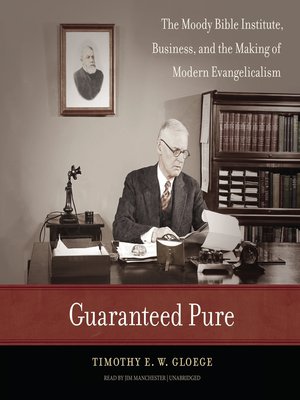Guaranteed Pure
audiobook (Unabridged) ∣ The Moody Bible Institute,Business, and the Making ofModern Evangelicalism
By Timothy E. W. Gloege

Sign up to save your library
With an OverDrive account, you can save your favorite libraries for at-a-glance information about availability. Find out more about OverDrive accounts.
Find this title in Libby, the library reading app by OverDrive.



Search for a digital library with this title
Title found at these libraries:
| Library Name | Distance |
|---|---|
| Loading... |
In the history of the Moody Bible Institute, founded in 1886 by shoe salesman turned revivalist Dwight Lyman Moody, Timothy Gloege finds an answer to why Christian ethics seem to go hand in hand with free-market capitalism. Taking the story back to the origins of modern fundamentalism as it arose within the social and cultural context of the Gilded Age and the Progressive Era, Gloege reveals longstanding connections between Chicago evangelicals and business and shows that the marriage between modern business and the so-called "old-time religion" developed symbiotically, forever altering the American religious landscape.
By 1920, a shifting coalition of businessmen, midlevel bureaucrats, and ministers had forged a remarkably resilient form of conservative evangelicalism that deviated in key respects from traditional Protestantism and that embraced modern consumer-oriented ideas and strategies. At the bottom was evangelicalism's thoroughgoing individualism, demonstrated prominently in the privilege it gave to a personal relationship with God as the essence of an authentic faith. This individualism aligned with key developments within capitalism and facilitated a remarkable confluence of business and religious ideas resistant to the influence of Darwinian science's basic orientation toward aggregated populations conditioned by nature or nurture.
For these evangelicals, to challenge capitalism was to challenge the foundations of evangelical orthodoxy. Guaranteed pure from both liberal theology and populist literalism, this was a new form of old-time religion not simply compatible with modern consumer capitalism but uniquely dependent on it.







